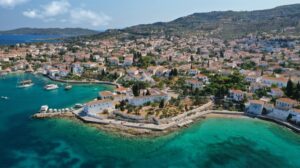People aged 50 and above, businessmen or senior and top business executives, is currently the main buying public of country houses in Greece.
These people have saved some money and wish to acquire, mainly a newly built property of high standards in the Greek market.
By far, the most populous category is for buyers with available budget, starting from 250,000 euros and going up to 600,000 euros. “Until before and in 2023, for the most part, the ‘ceiling’ of our customers was around 450,000 – 500,000 euros and this was for a relatively small number, as most were around 300,000 – 350,000 euros. Today, we see that this has changed and there is demand for more expensive homes, over 500,000 euros, certainly new constructions with private pool and large spaces, garden and other amenities,” says George Gavriilidis, managing director of Elxis-At Home In Greece, a specialized company for the sale and management of holiday homes in the Greek market, based in Utrecht, The Netherlands.
According to Elxis data, predominantly, those currently placing themselves in holiday homes are business people, or business executives, aged between 50 and 60, who have own use as their priority. Also, a significant buying group, involves younger buyers, aged 35 to 45, with high incomes, who look forward not only to the same use, but also to exploitation for a period of time and later resale with tax-free capital gains.
According to Elxis data, this is the key difference between younger buyers and the rest, who still make up the majority. That is, older people are more likely to choose a property for their own use and less likely to use it for their own use, or to resell it for a profit.
In contrast, this is not the case in younger age groups, and differences also arise based on the origin of the buyer. According to Mr Gavriilides, the most active investors are the Dutch and, secondarily, the Belgians. Around half of the buyers from these countries are investment-oriented, and they use their holiday home for the period when they are not using it themselves. In fact, some of them, especially the Dutch, do not hesitate to resell it in the short term, if they find that they can make a significant profit.
In a recent analysis, Elxis had pointed out that in recent years, holiday home sales prices have been increasing at an average annual rate of 8%-10%, depending on the region. In fact, it is predicted that this rate will be maintained in the coming years, with the result that Greece is considered an attractive destination for those aiming to invest in the purchase of secondary residences.
Similarly, buyers from the US, the UK are mainly turning to the same use, but now also to obtain a residence permit in Greece, through the “Golden Visa” program, even after the recent increase in the minimum investment amount from 250,000 to 400,000 euros, provided the holiday home is located on the mainland and not on an island, where the limit has now increased to 800,000 euros.
Buyers from countries such as Germany and France are also moving more towards owner-occupation, but some of them are also targeting rental, through short-term leases. Especially with regard to buyers from Germany, and secondarily for those from the US, it should be noted that a percentage of them, ranging between 10% and 20%, are expatriates who wish to own their first home in their country of origin.
The areas preferred by buyers
Holiday home buyers in the 250,000 – 600,000 euro category choose both areas of high tourist interest and other less prominent locations, depending on the “wants” of each. For example, buyers from North-West Europe (e.g. Dutch, Belgians, Germans, Swiss and French) prefer to acquire a holiday home in Crete, the Ionian Islands, the Peloponnese and Rhodes. Some of them also choose some of the Cyclades islands, where they can find good investment opportunities, which is also true for buyers from the US.
Ask me anything
Explore related questions





